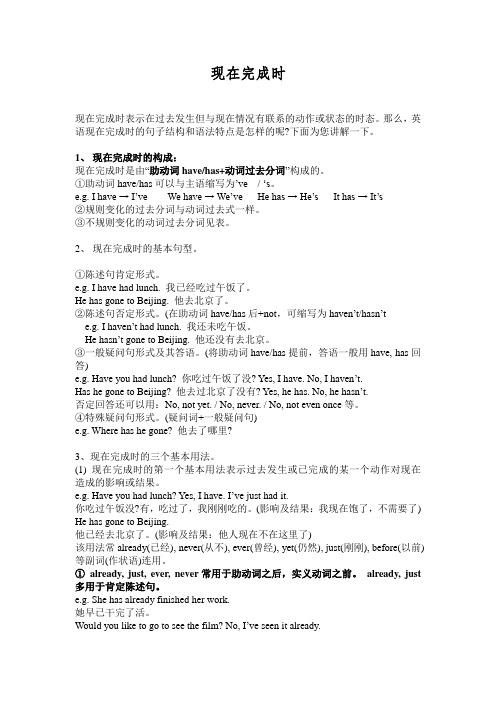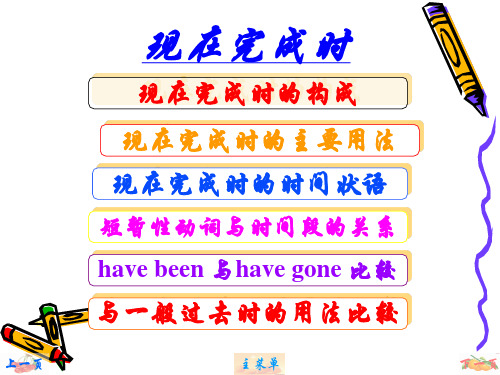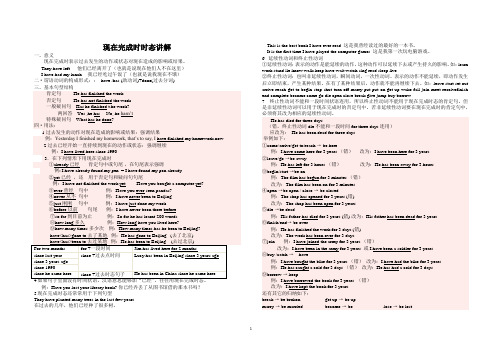现在完成时态讲解
初中时态讲解《现在完成时》(共28张PPT)

•
—I have _____ to Kunming with my
friends.
• A been , gone
B been , been
• C gone , been
D gone, gone
• ( C )2. How long have you ____ this book?
• A. bought B. borrowed C. had D. lent
Yes,she has.?No,she hasn’t.
4.时间状语:already, yet, ever, never, just, before , for, since, so far, till/until, up to now, in the past/last few years, recently, … 等.
5.现在完成时的概念
1)表示过去发生或已完成的动作对 现在造成的影响或结果;
2) 表示过去已经开始并一直持续 到现在的动作或状态。
• 意义1
• 表示过去发生或已完成的动作对现在造成的影响 或结果
My daughter hasjust gonoeut. 我女儿刚出去。 (go)
I’m sure we have metbefore. 我肯定我们以前见 过面。(meet)
3.They have left only for 5 minutes. 错 They have __b_ee_n_ __a_w_a_y only for 5 minutes.
• 1) They came here last week.
• They ____h_a_v_e__ _b_e_e_n_____ here since ______la_s_t_ w__e_e_k______.
现在完成时态讲解

现在完成时现在完成时表示在过去发生但与现在情况有联系的动作或状态的时态。
那么,英语现在完成时的句子结构和语法特点是怎样的呢?下面为您讲解一下。
1、现在完成时的构成:现在完成时是由“助动词have/has+动词过去分词”构成的。
①助动词have/has可以与主语缩写为‟ve / …s。
e.g. I have → I‟ve We have → We‟ve He has → He‟s It has → It‟s②规则变化的过去分词与动词过去式一样。
③不规则变化的动词过去分词见表。
2、现在完成时的基本句型。
①陈述句肯定形式。
e.g. I have had lunch. 我已经吃过午饭了。
He has gone to Beijing. 他去北京了。
②陈述句否定形式。
(在助动词have/has后+not,可缩写为haven‟t/hasn‟te.g. I haven‟t had lunch. 我还未吃午饭。
He hasn‟t gone to Beijing. 他还没有去北京。
③一般疑问句形式及其答语。
(将助动词have/has提前,答语一般用have, has回答)e.g. Have you had lunch? 你吃过午饭了没? Yes, I have. No, I haven‟t.Has he gone to Beijing? 他去过北京了没有? Yes, he has. No, he hasn‟t.否定回答还可以用:No, not yet. / No, never. / No, not even once等。
④特殊疑问句形式。
(疑问词+一般疑问句)e.g. Where has he gone? 他去了哪里?3、现在完成时的三个基本用法。
(1) 现在完成时的第一个基本用法表示过去发生或已完成的某一个动作对现在造成的影响或结果。
e.g. Have you had lunch? Yes, I have. I‟ve just had it.你吃过午饭没?有,吃过了,我刚刚吃的。
(完整版)现在完成时态讲解

• 特殊: • am/is-was-been are-were-been, • do (does)-did-done go-went-gone • see-saw-seen • show-showed-shown (showed)
③ She has gone home. 她回家去了。
注意:1)该句式中的have或has是助动词,has用于第三人称单数,其它人称 一律用have。
2)该句式中have(has)和过去分词之间可用just插入。 3)把该句式译成汉语时,往往用“已经”,“刚刚”,“过”或“了”等.
2.现在完成时一般疑问句式是把助动词have或has提到主语之前。 如: ④ Have you read this story book yet? 你读过这本故事书吗? ⑤ Has he eaten that apple yet? 他吃那个苹果了吗?
动词的过去分词的规则变化
动词的过去分词的规则变化,在动词后加ed,规则变化有以下四种: ①原形+ed 如:worked, passed ②词尾是e时,直接加d 如:liked lived ③若词尾为“辅音字母加y”,则改y为i加ed;词尾 为“元音字母+y”时, 直接加d。如: played stayed studied cried ④末尾只有一个辅音字母的重读闭音节是,双写最后一个辅音字母加ed. 如: stopped dropped
• put-put-put
cut-cut-cut
• let-let-let
set-set-set
• beat-beat-beat
hit-hit-hit
• hurt-hurt-hurt
spit-spit-spit
• rid-rid-rid
(完整版)现在完成时讲解

I have had this watch for five years / since 5 years ago.
2.这位老人已经死了十年了。
WThe old man has died for ten years.
The old man has been dead for ten years/since 10 years ago.
I have learnt English for more than ten years.我已经学了10多年的英语。
(从10年前开始,持续到现在还在学)
上一页
She has swum since half an hour ago. 我已经游泳了半个小时
(半个小时前已经开始游泳,到现在还在游)
主菜单
于助动词或系动词后,实义动词前。 • never用于句中,助动词或系动词后,实
义动词前,表示否定意义。
• He has ever been to Paris.
• He has never been to Paris.
3) just表示“刚刚”(用于完成时态时,与already, never 等副词的位置一样,多用在助动词have/has和 动词过去分词之间)
He has been here for three days.
He has been here since yesterday.
He has been here since two days ago / last Monday.
He has been here since his wife died.
Since he was a child ,he has lived in England.
现在完成时讲解

现在完成时讲解LEKIBM standardization office【IBM5AB- LEKIBMK08- LEKIBM2C】现在完成时讲解一.基本结构:助动词have/has+过去分词(done)二.句型:否定句:主语+have/has+not+过去分词+其他. 一般疑问句:Have/Has+主语+过去分词+其他. 简略答语: Yes, 主语 + have/has.(肯定) No, 主语 + haven't/hasn't.(否定)三.用法(1)现在完成时表示过去发生或已经完成的动作对现在造成的影响或结果I have spent all of my money (so far).(含义是:现在我没有钱花了.)Guo zijun has (just/already) come. (含义:郭子君现在在这儿)My father has gone to work.(含义是:我爸爸现在不在这儿)(2)现在完成时可以用来表示发生在过去某一时刻的,持续到现在的动作(用行为动词表示)或状态(be动词表示)常与for(+时间段),since(+时间点或过去时的句子)连用.①for+时段②since+过去一个时间点(译为:自从……以来)③since+时段+ago④since+从句(过去时)⑤It is+时段+since+从句(过去时)Mary has been ill for three days.I have lived here since 1998.四.has gone (to),has been (to), has been (in) 的区别Have/Has gone(to) :去了(现在不在说话现场)Where is your father?He has gone to Shanghai.Have/Has been (to) :去过(已不在去过的地方)My father has been to Shanghai.Have/has been in:呆了多久(还在所呆的地方)My father has been in Shanghai for two months. /since two months ago.五.现在完成时的标志1.现在完成时的含义之一是过去完成的动作对现在仍有影响,用以下四大标志词可以表达这种含义:* 以already, just和yet为标志He has already got her help.他已得到她的帮助。
_现在完成时态讲解

The Present Perfect Tense
一、结构:
助动词have / has + P.P(Past Participle) have /has 可与主语缩写为: ( -- ’ve /-- ’s)
1) I have (I’ve ) studied English since I was 4 years old. 自从4岁起我就一直学英语。
答语:Yes, 主+ have/ has. No, 主+ haven’t/ hasn’t.
现在完成时
The Present Perfect Tense
一、结构:
助动词have / has + P.P(Past Participle) have /has 可与主语缩写为: ( -- ’ve /-- ’s)
8)、我看过《西游记》这本书。 I have read the book Journey to the West. 9)、那个小男孩已经用光了所有的钱。 The little boy has already run out of all his money .
四、现在完成时态常与这些词连用:
just “刚刚”,位于句中,(just now与一般 过去时连用) already "已经”,用于肯定句句中 yet 用于否定句(还)和疑问句(已经)句末 never “从不,绝不”,位于句 ever “ 曾经”,位于句中 before “以前”, 位于句末, so far / up to now “到目前为止”, recently/ lately“最近””,位于句首或句末。 in the past 5 years “在最近5年” for + 一段时间 / since + 时间点
现在完成时时态讲解

现在完成时时态讲解一、意义现在完成时表示过去发生的动作或状态对现在造成的影响或结果。
They have left. --他们已经离开了(也就是说现在他们人不在这里) I have had my lunch. --我已经吃过午饭了(也就是说我现在不饿) 二·谓语动词的构成形式:: have /has (助动词)+done(过去分词)例:Have you lost your library book? 你已经弄丢了从图书馆借的那本书吗? 5现在完成时态还常常用于下列句型They have planted many trees in the last few years. 在过去的几年,他们已经种了很多树。
This is the best book I have ever read. 这是我曾经读过的最好的一本书。
It is the first time I have played the computer games. 这是我第一次玩电脑游戏。
6. 延续性动词和终止性动词 ①延续性动词:表示的动作是能延续的动作,这种动作可以延续下去或产生持久的影响。
如:learn work stand lie know walk keep have wait watch sing read sleep live②终止性动词:也叫非延续性动词,瞬间动词,一次性动词。
表示的动作不能延续,即动作发生后立即结束,产生某种结果。
在有了某种结果后,动作就不能再继续下去。
如:leave start set out arrive reach get to begin stop shut turn off marry put put on get up wake fall join meet receivefinish end complete become come go die open close break give jump buy borrow7. 终止性动词不能和一段时间状语连用,所以终止性动词不能用于现在完成时态的肯定句。
《现在完成时态》课件

05
现在完成时态的练习与巩固
选择题练习Leabharlann 01选择题1I ____(not see) the film yet.
02
答案
haven't seen
03
选择题2
He ____(not read) the book.
04
答案
hasn't read
填空题练习
填空题1
He ____(not finish) his homework yet.
02
现在完成时态的语义
已完成动作对现在的影响
01
已完成的动作或行为对现在的情 况或状态产生了影响。
02
例如:“我已经吃过饭了,现在 不饿。”
已完成动作与现在的联系
强调某个已完成的动作或行为与现在 的时间点有直接联系。
例如:“他去年买的车,现在还在开 。”
已完成动作与未来的关系
已完成的动作或行为对未来有一定的预示或影响。 例如:“我已经学了三年英语,未来打算去英国留学。”
现在完成时态的用法
总结词
现在完成时态可以用于描述已经完成的动作或状态,强调对现在的影响或结果,也可以用于表达推测、可能性和 虚拟语气等。
详细描述
现在完成时态常用于描述已经完成的动作或状态,并强调这些动作或状态对现在的影响或结果。例如,“我已经 吃过饭了”表示“我现在不需要吃饭”。此外,现在完成时态还可以用于表达推测、可能性和虚拟语气等,例如 “他可能已经回家了”和“如果我早点出发,现在已经到了”。
与since引导的时间状语连用
总结词
表示某个动作或状态从某一时间点开始一直持续到现在,并且这个动作或状态已经完成 。
详细描述
在现在完成时态中,当与since引导的时间状语连用时,表示某个动作或状态从某一时 间点开始一直持续到现在,并且这个动作或状态已经完成。例如,“I have studied English since I was 5 years old.”这句话表示说话者从5岁开始学习英语,一直学到
- 1、下载文档前请自行甄别文档内容的完整性,平台不提供额外的编辑、内容补充、找答案等附加服务。
- 2、"仅部分预览"的文档,不可在线预览部分如存在完整性等问题,可反馈申请退款(可完整预览的文档不适用该条件!)。
- 3、如文档侵犯您的权益,请联系客服反馈,我们会尽快为您处理(人工客服工作时间:9:00-18:30)。
现在完成时讲解
一.基本结构:助动词have/has+过去分词(done)
二.句型:
否定句:主语+have/has+not+过去分词+其他. 一般疑问句:Have/Has+主语+过去分词+其他.
简略答语: Yes, 主语+ have/has.(肯定) No, 主语+ haven't/hasn't.(否定)
三.用法
(1)现在完成时表示过去发生或已经完成的动作对现在造成的影响或结果
I have spent all of my money (so far).(含义是:现在我没有钱花了.)
Guo zijun has (just/already) come. (含义:郭子君现在在这儿)
My father has gone to work.(含义是:我爸爸现在不在这儿) (2)现在完成时可以用来表示发生在过去某一时刻的,持续到现在的动作(用行为动词表示)或状态(be动词表示)常与for(+时间段),since(+时间点或过去时的句子)连用.
①for+时段
②since+过去一个时间点(译为:自从……以来)
③since+时段+ago
④since+从句(过去时)
●⑤It is+时段+since+从句(过去时)
Mary has been ill for three days.
I have lived here since 1998.
四.has gone (to),has been (to), has been (in) 的区别
Have/Has gone(to) :去了(现在不在说话现场)
Where is your father?He has gone to Shanghai.
Have/Has been (to) :去过(已不在去过的地方)
My father has been to Shanghai.
Have/has been in:呆了多久(还在所呆的地方)
My father has been in Shanghai for two months. /since two months ago.
五.现在完成时的标志
1. 现在完成时的含义之一是过去完成的动作对现在仍有影响,用以下四大标志词可以表达这种含义: * 以already, just和yet为标志
He has already got her help. 他已得到她的帮助。
He has just seen the film. 他刚刚看过这场电影。
He hasn't come back yet. 他还没有回来。
* 以ever和never为标志
This is the best film I have ever seen. 这是我曾经看过的最好的一部电影。
He has never been to Beijing. 他从没有到过北京。
* 以动作发生的次数为标志
He says he has been to the USA three times. 他说他已经去过美国三次了。
* 以so far(到目前为止)为标+before
He has got to Beijing so far. 到目前为止他已到了北京。
She has passed the examso far. 到目前为止她已经通过了考试。
2.过去已经开始的动作一直延续到现在, 甚至有可能继续延续下去,我们可以从动作“延续”的特性和“时间”点段的区分入手,进一步学习现在完成时。
* ①for+时段②since+过去一个时间点(过去从句)为标志
注意:1)现在完成时不能单独与过去的时间状语连用, 如yesterday,last week, three years ago 等; 2)不能与when连用 2.现在完成时往往同表示不确定的过去时间状语连用
六.过去分词
1 、规则动词:规则动词的过去分词的构成规则与规则动词的过去式的构成规则相同。
四点变化规则:
(1)、一般动词,在词尾直接加“ ed ”。
work---worked---worked ,visit---visited---visited
(2)、以“ e ”结尾的动词,只在词尾加“ d ”。
live---lived---lived ,
(3)、以“辅音字母+ y ”结尾的动词,将"y" 变为"i" ,再加“ ed ”。
study---studied---studied ,cry---cried---cried
(4)、重读闭音节结尾,末尾只有一个辅音字母,先双写该辅音字母,再加“ ed ”。
stop---stopped---stopped , drop---dropped--dropped
2 、不规则动词见不规侧动词变化表:
特殊词:
★1.have代替buy
My brother has had(不能用has bought) this bike for almost four years. ★2、用keep或have代替borrow
I have kept(不能用have borrowed) the book for quite a few days.
★3、用be替代become
How long has your sister been a teacher?
★4、用have a cold代替catch a cold
Tom has had a cold since the day before yesterday.
★5、用wear代替put on
b)用“be+形容词”代终止性动词
1、be+married代marry
2、be+ill代fall (get) ill
3、be+dead代die
4、be+asleep代fall (get) asleep
5、be+awake代wake/wake up
6、be+gone代lose,die,sell,leave
7、be+open代open 8、be closed代close/shut
9、be+missing(gone,lost)代lose
c)用“be+副词”代终止性动词
1“be+on”代start,begin
2“be+up”代get up
3“be+back(to)”代return to,come back to,go back to
4“be here (there)”代come(arrive,reach,get) here或go (arrive,reach,get) there等等
d)用“be+介词短语”代终止性动词
1.“be in/at +地点”代替go to /come to
2.用be in the army 代替join the army
3.“be in/at +地点”代替move to
常用瞬间动词变延续性动词表:
1. have arrived at/in sw. got to/reached sw. come/gone/moved to sw.
→have been in sw./at…相应的介词
2. have come/gone back/returned → have been back
3. have come/gone out →have been out
4. have become →have been
5. have closed / opened→ have been close/open
6. have got up → have been up;
7. have died → have been dead;
8. have left sw. → have been away from sw.
9. have fallen asleep/got to sleep → have been asleep;
10. have finished/ended/completed → hav e been over;
11. havemarried → have been married;
12. have started/begun to do sth. → have done sth. ;
13. have begun → have been on
14. have borrowed/bought →have kept/had
15. have lost → haven’t had
16. have put on →have worn
17. have caught /get a cold → have had a cold;
18. have got to know → have known
19. have/has gone to → have been in
20. have joined/have taken part in the league/the Party/the army。
